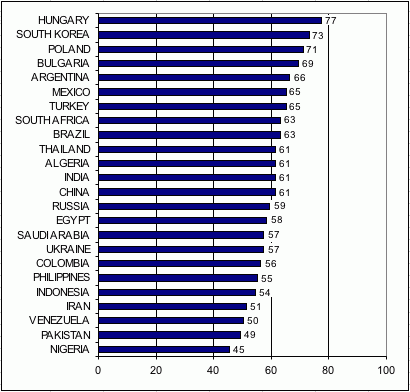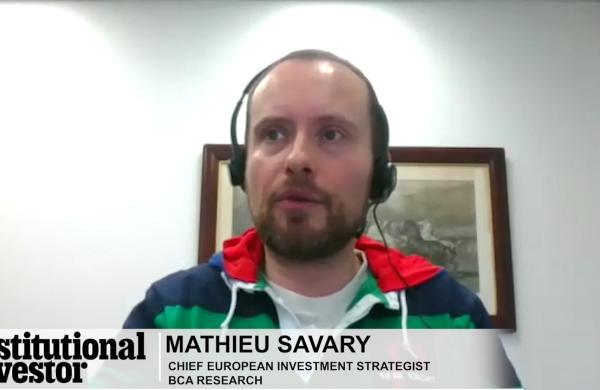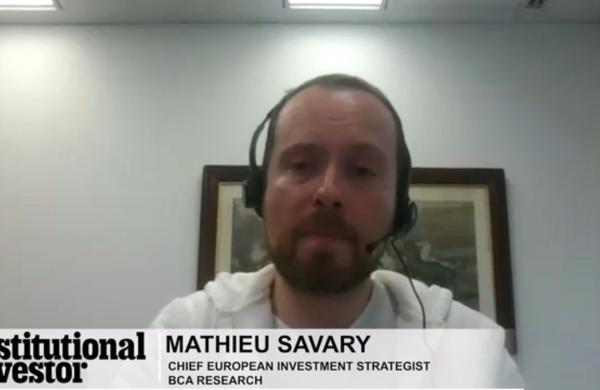By Roberto Herrera-Lim and Amitabh Dubey
The Deutsche Bank Eurasia Group Stability Index (DESIX) was released today featuring updated monthly ratings on political stability in 24 emerging markets nations. India and Thailand were the only two countries whose scores dropped this month. In Thailand, the September coup that brought down former Prime Minister Thaksin Shinawatra has created a sense of order in the short term, but the longer-term outlook for stability is clouded with uncertainty. A significant drop in Thailand’s government variable score pulled the country’s overall score down by two points to 61. In India, lower government and security scores led to a one-point decline in its overall score to 61 this month. The progress that Prime Minister Manmohan Singh made in India’s nuclear deal with the US will likely be stalled in the wake of North Korea’s nuclear test earlier in the month. Meanwhile, a breakdown in talks between the government and separatist rebels in Assam and India’s failure to reach a ceasefire with the Kashmiri insurgent group Hizbul Mujahideen worsened the security outlook.
The volatility that followed the coup that removed Thaksin from office has all but subsided, but fears are mounting that country could return the country to the weak, coalition-driven politics that plagued Thailand before the 1997 constitution was drafted. There have been renewed fears of heightened and more frequent military intervention into domestic politics. The process of drafting the new constitution may eventually prove a source of contention. Most Bangkok residents, however, appear willing to support the interim government and the military as long as they maintain a credible timeline for the restoration of a freely elected government.
In India, North Korea’s nuclear test serves as a setback for the government of Prime Minister Singh because it will most likely cause a delay in the US Senate’s approval of legislation for the US-India civilian nuclear agreement until after November midterm elections. If the Democrats take control of either the House or the Senate or both, they could decide to postpone action further until January. A January vote would put the entire process back at square one and the legislation would have to face a new Congress with new obstacles. On the domestic security front, the Indian government took two steps backwards in its peace negotiations with the secessionist United Liberation Front of Asom. The government had chosen not to renew a unilateral ceasefire that began in August after the group failed to accede to its demand to express its willingness to negotiate in writing; the government does not feel that the group is serious about talks. Meanwhile, progress on a ceasefire with the Hizbul Mujahideen remains at a deadlock because of the group’s refusal to halt its military operations without an Indian commitment to withdraw security forces, release prisoners and accept Kashmir’s status as a disputed state.

* * *
About the DESIX
The Deutsche Bank Eurasia Group Stability Index (DESIX) is the first comparative political and economic index designed specifically to measure stability in emerging markets. Constructed by Eurasia Group on the basis of leading social science theories, the index incorporates twenty composite indicators of risk, including both quantitative and qualitative criteria of stability—defined as the capacity of countries to withstand shocks and crises and to avoid generating shocks and crises. The DESIX ranks countries according to their capacity to withstand shocks and crises and to avoid generating crisis. Ratings are expressed on a scale of 0-100, with higher numbers corresponding to higher country stability. The composite stability ratings are broken into categories: Maximum Stability (80-100), High Stability (60-80), Moderate Stability (40-60), Low Stability (20-40) and Failed State Stability (0-20).
About Eurasia Group
Eurasia Group is a research and consulting firm that focuses on global political risk and emerging market country analysis, serving major financial institutions, multinational corporations and governments. Founded in 1998, Eurasia Group has a full-time staff of 80, a global network of more than 480 in-country experts and partners covering more than 65 countries. Eurasia Group is headquartered in New York, with offices in Washington, DC and London.
www.eurasiagroup.net
About Deutsche Bank
Deutsche Bank <NYSE: DB> is a leading global investment bank with a strong and profitable private clients franchise. A leader in Germany and Europe, the bank is continuously growing in North America, Asia and key emerging markets. With Euro 1,058 billion in assets and 65,435 employees in 73 countries, Deutsche Bank offers unparalleled financial services throughout the world. The bank competes to be the leading global provider of financial solutions for demanding clients creating exceptional value for its shareholders and people.
www.db.com






